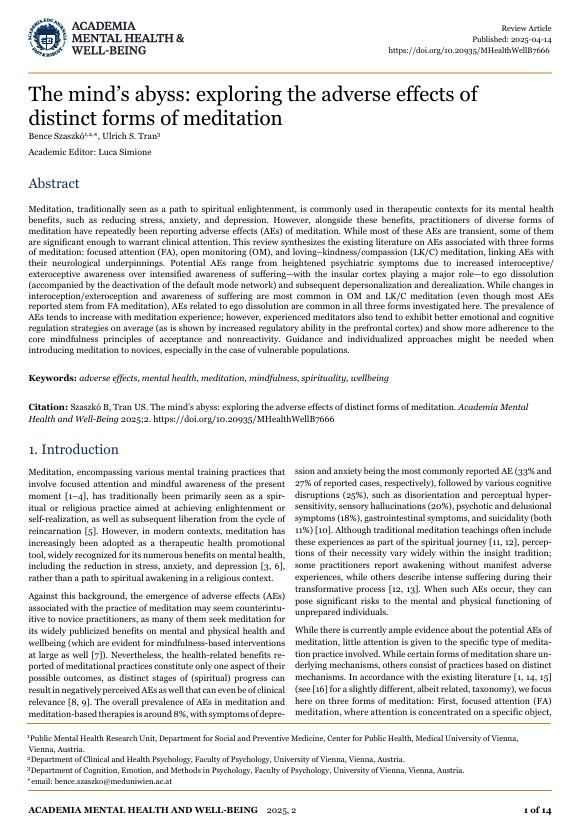The mind’s abyss: exploring the adverse effects of distinct forms of meditation
Meditation, traditionally seen as a path to spiritual enlightenment, is commonly used in therapeutic contexts for its mental health benefits, such as...
Also Available in:
- Amazon
- Audible
- Barnes & Noble
- AbeBooks
- Kobo
More Details
Meditation, traditionally seen as a path to spiritual enlightenment, is commonly used in therapeutic contexts for its mental health benefits, such as reducing stress, anxiety, and depression. However, alongside these benefits, practitioners of diverse forms of meditation have repeatedly been reporting adverse effects (AEs) of meditation. While most of these AEs are transient, some of them are significant enough to warrant clinical attention. This review synthesizes the existing literature on AEs associated with three forms of meditation: focused attention (FA), open monitoring (OM), and loving–kindness/compassion (LK/C) meditation, linking AEs with their neurological underpinnings. Potential AEs range from heightened psychiatric symptoms due to increased interoceptive/exteroceptive awareness over intensified awareness of suffering—with the insular cortex playing a major role—to ego dissolution (accompanied by the deactivation of the default mode network) and subsequent depersonalization and derealization. While changes in interoception/exteroception and awareness of suffering are most common in OM and LK/C meditation (even though most AEs reported stem from FA meditation), AEs related to ego dissolution are common in all three forms investigated here. The prevalence of AEs tends to increase with meditation experience; however, experienced meditators also tend to exhibit better emotional and cognitive regulation strategies on average (as is shown by increased regulatory ability in the prefrontal cortex) and show more adherence to the core mindfulness principles of acceptance and nonreactivity. Guidance and individualized approaches might be needed when introducing meditation to novices, especially in the case of vulnerable populations.
- Format:ebook
- Pages:14 pages
- Publication:2025
- Publisher:Academia Mental Health and Well-Being
- Edition:
- Language:
- ISBN10:
- ISBN13:
- kindle Asin:B0FSJM2T8R










